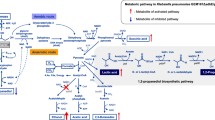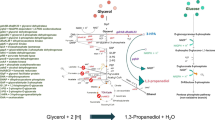Abstract
Although plasmid-dependent microbial breeding is predominant in manufacturing bio-based chemicals, it shows pitfall of genetic instability and thus hinders industrial production. Alternatively, chromosome engineering free from plasmid enables genetic stability and thus represents the new trend of microbial breeding. 3-Hydroxypropionic acid (3-HP) is an economically important platform compound as the versatile precursor of a suite of C3 compound, such as 1, 3-PDO. Klebsiella pneumoniae is regarded as a promising host strain due to both its dha regulon and exceptional glycerol fermentation ability. To produce 3-HP in K. pneumoniae, the IS1 region in chromosome was replaced with the AD DNA cassette containing aldH gene from E.coli through homologous recombination approach. The engineered recombinant converted glycerol into 3-HPA and then 3-HP when 40 g/L of initial glycerol was added. The novelties of this study comprise (i) the genetic stability of plasmid-free strains (ii) without using any inducer and antibiotics and thus more applicable than plasmid-based strains.




Similar content being viewed by others
References
Ashok S, Raj SM, Rathnasingh C, Park S (2011) Development of recombinant Klebsiella pneumoniaeΔ dhaT strain for the co-production of 3-hydroxypropionic acid and 1,3-propanediol from glycerol. Appl Microbiol Biotechnol 90(4):1253–1265
Borodina I, Kildegaard KR, Jensen NB (2015) Establishing a synthetic pathway for high-level production of 3-hydroxypropionic acid in Saccharomyces cerevisiae via β-alanine. Metab Eng 27:57–64
Forage RG, Foster MA (1982) Glycerol fermentation in Klebsiella pneumoniae: functions of the coenzyme B12-dependent glycerol and diol dehydratases. J Bacteriol 149(2):413–419
Forage RG, Lin EC (1982) Dha system mediating aerobic and anaerobic dissimilation of glycerol in Klebsiella pneumonia NCIB 418. J Bacteriol 151(2):591–599
Friehs K (2014) Plasmid copy number and plasmid stability. Adv Biochem Eng Biotechnol 86:47–82
Green MR, Sambrook J (2012) Molecular cloning: a laboratory manual. Cold Spring Harbor Laboratory, New York
Kumar V, Ashok S, Park S (2013) Recent advances in biological production of 3-hydroxypropionic acid. Biotechnol Adv 31(6):945–961
Li Y, Ge X, Tian PF (2013) Gene arrangements in expression vector affect 3-hydroxypropionic acid production in Klebsiella pneumoniae. Indian J Microbiol. 53(4):418–424
Li Y, Tian PF (2015) Contemplating 3-hydroxypropionic acid biosynthesis in Klebsiella pneumoniae. Indian J Microbiol. 55(2):131–139
Ramakrishnan GG, Nehru G, Suppuram P, Balasubramaniyam S, Gulab BR, Subramanian R (2015) Bio-transformation of glycerol to 3-hydroxypropionic acid using resting cells of Lactobacillus reuteri. Curr Microbiol 71(4):517–523
Stephanopoulos G, Jaggard KE (2011) Genetically stabilized tandem gene duplication. US patent 20110236927
Su M, Li Y, Ge X, Tian PF (2015) 3-Hydroxypropionaldehyde-specific aldehyde dehydrogenase from Bacillus subtilis catalyzes 3-hydroxypropionic acid production in Klebsiella pneumoniae. Biotecnol Lett. 37(3):717–724
Tyo KE, Ajikumar PK, Stephanopoulos G (2009) Stabilized gene duplication enables long-term selection-free heterologous pathway expression. Nat Biotechnol 27(8):760–765
Valdehuesa KN, Liu H, Nisola GM, Chung WJ, Lee SH, Park SJ (2013) Recent advances in the metabolic engineering of microorganisms for the production of 3-hydroxypropionic acid as C3 platform chemical. Appl Microbiol Biotechnol 97(8):3309–3321
Werpy T, Petersen G (2004) Top value added chemicals from biomass. U.S.DOE, Washington
Zhou S, Catherine C, Rathnasingh C, Somasundar A, Park S (2013) Production of 3-hydroxypropionic acid from glycerol by recombinant Pseudomonas denitrificans. Biotechnol Bioeng 110(12):3177–3187
Acknowledgement
This work is supported by National Natural Science Foundation of China (No. 21276014, 21476011).
Author information
Authors and Affiliations
Corresponding author
Rights and permissions
About this article
Cite this article
Wang, K., Tian, P. Engineering Plasmid-Free Klebsiella Pneumoniae for Production of 3-Hydroxypropionic Acid. Curr Microbiol 74, 55–58 (2017). https://doi.org/10.1007/s00284-016-1153-2
Received:
Accepted:
Published:
Issue Date:
DOI: https://doi.org/10.1007/s00284-016-1153-2




